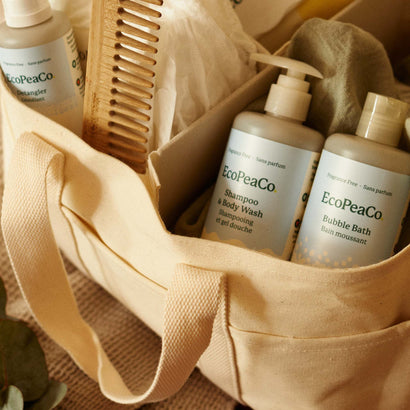Oh summer, a lovely time for rest, play, and family togetherness. This season is often ripe with opportunities for joy, but unfortunately, also has many environmental pitfalls with all the travel and need for items like sunscreen and bug spray that are often loaded with toxins. Luckily, there are many ways to avoid these pitfalls and engage in practices that not only do no harm to the environment, but also help it heal.
Here are some ideas for how to help you and your family have your greenest summer yet.
Choose eco-conscious and reef-safe sunscreen. When selecting the sunscreen that will protect your family from those UVA and UVB rays this summer, opt for an option that is free of chemicals that can harm your family and the environment.
Avoid sunscreen that contains Oxybenzone, as this ingredient can disrupt hormones and harm aquatic life. Homosalate is another hormone disruptor that doesn’t easily break down in the environment. An additional ingredient to avoid is Octinoxate, sometimes called OMC, as it’s linked to endocrine disruption and reproductive toxicity, and can harm coral reefs.
Regarding what to look for in a safe, more eco-conscious, sunscreen, it’s best to choose an option that is primarily composed of Micronized Zinc Oxide or Titanium Dioxide. Look for words like mineral based. You also want to select a sunscreen that is Broad Spectrum.
Buy DEET-free bug spray. When you start the hunt for the right bug spray, stay away from brands that use DEET. This toxin can irritate eyes and skin, and is an environmental contaminant that breaks down slowly in soil. In addition, DEET has been found to be slightly toxic to animals that are exposed to it in waterways. A safer alternative is bug sprays that have main ingredients like picaridin, lemon eucalyptus oil, and citronella.
Opt for staycations. As aviation contributes about 2% of the world’s global carbon emissions, meaning it has a significant impact on global warming, it’s best to avoid flying whenever possible. It’s also best to steer clear of long trips in a standard vehicle, as driving can lead to the release of hydrocarbons, nitrogen oxides, carbon monoxide, and carbon dioxide.
To keep your vacation time “green,” opt for staycations over trips that require considerable travel. You can book a local vacation rental, explore all the areas around your hometown you’ve never seen, go on a food tour, or do anything else that includes more fun than work, and minimal transit time.
Frequent your local farmer’s market. Buying the bulk of your food at a farmer’s market can offer an abundance of perks for the health of your family and the environment (plus, it's a fun outing). First off, you're limiting the exposure your family, and the planet to the pesticides often used on non-organic produce. These pesticides can increase the risk of cancer, and might impact the immune and nervous systems. Regarding the planet, pesticides can contaminate soil, water, turf, and other vegetation, and harm wildlife.
An additional consideration is that produce not grown locally usually has to be shipped over a significant distance. This travel often causes farmer’s to pick produce before it’s ripe, which could limit the amount of nutrients the food contains by the time it reaches your plate. And then there’s the transport vehicles that release harmful toxins into the air.
Plant a garden. The balmy days of summer are a great time to get outside with your family and plant a garden. This activity can help your children understand that produce doesn’t just magically appear at the grocery store, and recognize that the Earth’s health is directly connected with our ability to feed ourselves. In addition, planting a garden will reduce the amount of food you need to purchase at the grocery store, and ensures your produce isn’t grown with any chemicals.
You can stoke your family’s excitement about the garden by having them help you decide what to plant. Some great options for the summer are cucumbers, tomatoes, peppers, squash, greens, berries, and melons. If you're short on space, try container gardening on your patio or even a window-sill.
Avoid overusing air conditioning. Did you know that air conditioning often requires a refrigerant that results in gaseous emissions that contribute to global warming and ozone layer depletion? Yup. So to cut back on the emissions coming from your home, only use air conditioning when it’s absolutely necessary. And to limit the amount of time it’s absolutely necessary, you can open your windows in the evening to let in cool air, and close them (and the blinds) first thing in the morning. You can also invest in some fans, make your own popsicles, and head to a park with lots of shade, or a local body of water, during the hottest part of the day.
Get into nature. Instead of using your free-time to go to places like amusement parks or the mall, use the summer as an opportunity to get your family into nature. You can take the kids to local parks, explore hiking trails, hunt for idyllic spots to picnic, go camping, enjoy nearby rivers, lakes, or coasts, and do anything else that gets everyone into the great outdoors.
Volunteer for environmentally-focused organizations. Get involved in the protection of your local ecosystem by volunteering for eco-centered organizations. This might lead to projects like trash pick-ups, trail maintenance, planting a neighbourhood garden, removal of an invasive plant species, and tree planting. An online search can likely lead you to organizations that would be a good fit.
So there you have it – simple ways to create a summer that promotes the wellbeing of your family and your planet. As you engage in these activities, keep your eyes open for additional ways to make your summer “greener,” and encourage your family to do the same. And when Fall rolls around, you might just find that the eco-conscious habits your family developed over the summer are here to stay, and have inspired you to do more.









